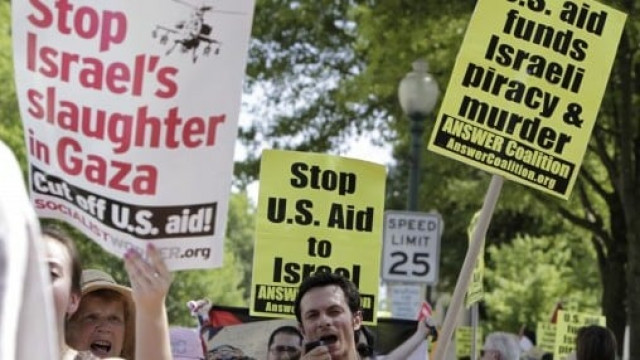Analysis: Why UN statehood for Palestine is pointless
Palestinians view the move by the PA president as a safeguard against a popular uprising similar to the Arab Spring.

Out on the streets of Beirut and particularly in and around the crowded Palestinian refugee camps in the last week of July, one frequently saw Palestinians chanting slogans and waving their national flag. No matter what the occasion, these gatherings always reiterate Palestinian people’s right to return to their homeland from which they were expelled six decades ago on the creation of Israel.
With the same goal in mind, the Palestinian National Authority (PA) will present its case of recognition as a state of a broken up rump Palestine – bits and pieces of Palestine that remain on the West Bank – to the United Nations next month.
But for many, returning home still seems like a far-fetched ideal.
At the Viva Palestina Arabia conference at the American University of Beirut, there was little enthusiasm among the Palestinians for the idea of a UN membership for rump Palestine.
Far from helping it, the PA’s bid for UN recognition has worsened its political crisis. Palestinians point out that it is meaningless for towns, villages and refugee camps surrounded by Israeli walls to be presented as a sovereign state.
Dr Ghada Karmi, a leading Palestinian activist and writer, has for decades been an ardent supporter of a civil revolt as opposed to armed resistance. She, however, was severely critical of the insistence of PA president Mahmoud Abbas’s Fatah group on talks with Israel. “They (Fatah) have closed all doors,” said Karmi, 74, while referring to the president’s position that negotiations are the only means to a solution. “Once your enemy knows that carrying out [futile] talks is all you are capable of, he won’t care. You can talk for as long as you like and they (the Israelis) will build settlement upon settlement,” she added.
Among the most prominent sceptics of the idea of a premature state is Leila Khaled, a leader of the leftist Popular Front for the Liberation of Palestine. Khaled, 67, who herself is a refugee from Palestine, is an icon for Palestinians since her hijacking of a TWA airliner in 1969. “People who support negotiations, must identify whom the Palestinians must negotiate with,” she said at the Viva Palestina event. For her the United States’ repeated use of its veto power in favour of Israel is the main reason for the stalled progress on the road to a solution of the Middle East dispute.
The US insistence on a mediatory role between the two parties is inconsistent with its policies in the Middle East which are hostile to Arabs. Armed intervention in the name of democracy in Iraq and support to the Western-backed Libyan rebels makes Palestinians understandably wary of the prospect of Americans being interlocutors in negotiations with Israel.
Palestinians generally view the move for UN-sanctioned statehood as a desperate move by the PA president as a safeguard against a popular uprising similar to the Arab Spring.
(Read: Youm-Al-Quds: Protesters demand America, UN to stop playing double game in Palestine)
Published in The Express Tribune, September 3rd, 2011.



















COMMENTS
Comments are moderated and generally will be posted if they are on-topic and not abusive.
For more information, please see our Comments FAQ